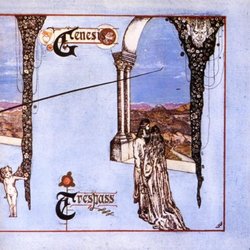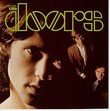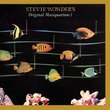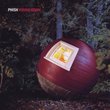| All Artists: Genesis Title: Trespass Members Wishing: 7 Total Copies: 0 Label: Virgin / EMI Europe Generic Release Date: 1/1/2008 Album Type: Import, Original recording remastered Genres: Pop, Rock, Classic Rock Styles: Progressive, Progressive Rock, Album-Oriented Rock (AOR) Number of Discs: 1 SwapaCD Credits: 1 UPC: 724383977321 |
Search - Genesis :: Trespass
 | Genesis Trespass Genres: Pop, Rock, Classic Rock
Japanese only two disc (SACD Hybrid CD + NTSC/Region 0 DVD) pressing of this album housed in a mini LP sleeve. EMI. |
Larger Image |
CD DetailsSynopsis
Album Description Japanese only two disc (SACD Hybrid CD + NTSC/Region 0 DVD) pressing of this album housed in a mini LP sleeve. EMI. Similarly Requested CDs
|
CD ReviewsDark Early Progressive Rock sealchan | Oregon, United States | 11/15/2009 (4 out of 5 stars) "Trespass - Genesis (3.75 stars) Original Release: 10/23/1970 Songs: Looking for Someone (3 stars) Some sinister force or element seems to be personified here in the lyrics to this song. After the vocal sections there is an aggressive, progressive instrumental section that arises and moves through a number of themes. A good early example of a truly progressive rock song although this one does not capture my interest as strongly as others on this album. White Mountain (4 stars) Keyboards and guitars effectively introduce us to what I imagine to be a story in an alpine wilderness where the drama of this song story seems to take place. This perception could in large measure be due to the fact that the wolves about whom the story revolves have almost identical names to two wolves in Jack London's "white Fang" although this is where the similarities end. The instrumentation complements the story well. There is a definite lack of moral interpretation to the events which also keeps the story and the music in an intriguing alien space. Still connected to my Jack London associations I found the whistling and humming in the coda to this song to introduce a human presence in a tale about animals that seemed emotionally compelling. Visions of Angels (3 stars) The lyrics speak bleakly of dreams and wishes which systematically never come to pass. The upbeat and hopeful tone of the music comes off as sarcasm in this context. There is an interesting progressive instrumental section to this song. Stagnation (4 stars) From the album notes for this song: To Thomas S. Eiselberg, a very rich man, who was wise enough to spend all his fortunes in burying himself many miles beneath the ground. As the only surviving member of the human race, he inherited the whole world. Without this intriguing clue I don't think it would be possible to make much sense of the lyric's on this song. As the song moves in a more-or-less linear fashion through a series of musical themes and the lyrics along with it, there is painted a bizarre picture of a world full of futility and failure although the song's and song's protagonist seems to still find ways to respond to that world with a variety of emotions. This song requires some imagination to pull it together but I think that it ends up being evocative. A great example of a thoroughly progressively structured song. Dusk (4 stars) The music is gentle and serene but again the lyrics are coldly despondant. Nice vocals both solo and group. The lyricist oscillates between a measured view of lifes destructive energies and seeming despair. Flute and guitar pick up the energy in the center of the song and fill a gentle instrumental progression. The final lyrical section takes a stab at God and then declares our final fate: But wait, on the horizon, A new dawn seems to be rising, Never to recall this passerby, born to die. The Knife (3 stars) This song has more aggression in it by far than the rest. It is also the longest. The lyrics describe a no holds barred attitude of violent revolution without any effort at moral justification. Without any clues to reveal a tone of sarcasm, I have to wonder whether the song was meant to show the horror of imposing one's own will without reservation: I'll give you the names of those you must kill, All must die with their children. Carry their heads to the palace of old, Hang them high, let the blood flow. Perhaps the stage performance helped to put this song in context. Vocal and instrumental passages progress through a connected variety of themes. Relentlessly militant, this song breaks the mood of the rest of the album somewhat but has much to hold interest. A very dark and heavy song. Album: Song composition and mood and lyrical content rise well above the standard pop/rock fare. Excellent song composition with a great variety of musical ideas well connected. I suspect that already Genesis were the masters of musical transitioning making a song seem to sit well with itself despite its rich assortment of musical themes. So far there seem to be progressive rock albums that have two different overall emotional outlooks: the hope of Yes and the Moody Blues and the darkness and despair of ELP and King Crimson. The lyrics of Peter Gabriel are dark indeed and seem to intentionally avoid any kind of apologetics or moralism. This gives the songs on this album a certain raw strength but it may leave you cold and sometimes disagree with the tone of the instruments. But mainly these songs seem artfully crafted. Already Genesis is showing their skill at song composition that made them one of the greatest progressive rock bands. Overall, this album probably would have had a bigger positive impact on me had I heard it first in the context of its time. As it was I traced my way back to it from the 80's perspective from which my musical interests originated. I also have the non-re-mastered edition and my opinion of this album might improve (some song ratings that were 3's might become 4's) if I heard a better recording. The album as a whole is a worthwhile addition to any progressive rock fan's collection. I've heard Genesis' earlier From Genesis to Revelation and like the Moody Blues' first album I have not bothered to purchase it as its style is much too poppy for my tastes. MP3 recommendation: There isn't too much call to not buy the whole album but here are those songs I gave 4 stars to rather than just 3. 4 star songs (4 stars) 1. White Mountain (4 stars) 2. Stagnation (4 stars) 3. Dusk (4 stars) 4. The Knife (4 stars)" 1/2 -- Quite complex, and a clear indication of things to co Johnny Boy | Hockessin, DE | 03/14/2010 (4 out of 5 stars) "When Genesis made their debut, 'From Genesis to Revelation' in 1969, it was clearly more Jonathan King, their producer's album, then theirs. The record featured mostly '60s Brit pop tunes heavily influenced by the early-day Bee Gees. They then left Decca Records and signed on ABC Records in 1970. By this time, the band was Peter Gabriel on vocals, Anthony Phillips on guitars, Mike Rutherford on bass guitar, Tony Banks on all keyboards, and John Mayhew on drums (no Phil Collins just yet -- he'd join in later in the year).
The new lineup (Mayhew replaced drummer Chris Stewart later in 1969) went into the studio and released 'Trespass' in October 1970. With this album, Genesis provided a clear indication of things to come -- goodbye, simple pop tunes, and hello progressive rock royalty. So, how does this album measure up nearly 40 years later? Well, it's an outstanding album. Sure, the band would gain more confidence as they progressed, but they were still capable of writing some mighty-fine prog rock in 1970. 'White Mountain' is one of my all-time favorite songs; Tony's organ and Mayhew's drumming drive the song and make it one of the great early progressive tracks. This song was so popular, in fact, Genesis would frequently play it live in on their 1976 'A Trick of the Tail' tour with Phil Collins (who wasn't even in the band at this time) singing lead on it. 'Looking for Someone' could have easily been featured on their next album, 'Nursery Cryme.' Gabriel's mellow voice is accompanied by Tony's organ throughout most of the song. This is another clear indication of things to come for this legendary band. I've always liked 'Visions of Angels.' Critics have ripped on it in the past for having "weak lyrics." I hear nothing of the sort. I think it's a very good and quite interesting track, another Tony-dominated track. Anthony also plays very nice acoustic, classical style guitar. 'Visions' is a good song; sure, it's no 'Fountain of Salmacis,' but it's still a fine song that is definitely worth a listen. 'Stagnation' and 'Dusk' are also songs heavily driven by Anthony, and also Mike. Gabriel's voice is calm on these tracks, which are perfectly mellow. 'Stagnation' is also a song the band would sample in the future; Genesis would play a part of it -- albeit very briefly -- during their 1980 tour with their 'Cage' medley. 'Dusk' is probably the weakest song on the album; believe me, it's very good, but it's just not as great as the others. Although it is a nice acoustic-driven tune that I do appreciate very much. And finally, to conclude the album, Genesis delivers their (well, at least up to that point) magnum opus. 'The Knife.' At 8:55, Genesis makes the most out of these nine minutes. It's by far the best song on the album; it's so complex, and the entire band dominates throughout. Mike's haunting bass line, Tony's incredible skill at the organ, Ant's virtuoso moves on the guitar, Pete's chilling vocals, and Mayhew's steady beat dominate this song throughout. Genesis would play this song live up until 1981 (although sporadically after Collins became lead singer). This song, musically, gave more hints as to where the band were going then other song on the album. What an incredible song. (Note: look for the great live version of this on their 1973 live album 'Genesis Live'). As you all probably know, after this record, guitarist and founding member Anthony Phillips departed, as did drummer John Mayhew. Mayhew was replaced by 20-year old drummer Phil Collins; Phillips was replaced by Steve Hackett, who would stay with the band until early-1978. The group got musically better with their next album, 'Nursery Cryme' and even better with the albums that followed. But overall, if you are a Genesis fan, you need to own 'Trespass.' This is basically where it all began. This is where the band became the progressive band that dominated their sound for the next 12 years (before they "sold out," but that's a different story). 'Trespass' is a must own record for any Genesis fan, and more importantly, for any progressive rock fan. Highly recommended for any progressive rock or Genesis fan. ENJOY!!!" |

 Track Listings (6) - Disc #1
Track Listings (6) - Disc #1








